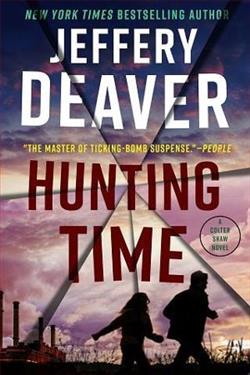In Hunting Time, Jeffery Deaver delivers yet another gripping thriller that showcases his mastery of suspense and intricate plotting. The novel introduces us to Allison Parker, a brilliant engineer who finds herself in a desperate situation, fleeing from her ex-husband, Jon Merritt, a former police detective recently released from prison. The stakes are high as Allison is not only trying to protect herself but also her teenage daughter, Hannah. Deaver's ability to weave a narrative that keeps readers on the edge of their seats is evident from the very first page.
The book opens with a sense of urgency, setting the tone for a relentless chase that is both physical and psychological. Deaver employs a classic trope of the hunted versus the hunter, but he elevates it by introducing Colter Shaw, a skilled tracker hired to find and protect Allison. Shaw is a complex character, embodying the traits of a modern-day hero with a moral compass that guides his actions. His background and expertise in tracking missing persons add depth to the narrative, making him a compelling figure as he navigates the treacherous landscape of deception and danger.
One of the most striking themes in Hunting Time is the concept of survival. Deaver outlines three fundamental rules of survival, each of which serves as a guiding principle for the characters. The first rule, "Never be without a means of escape," resonates deeply with Allison's plight. As an engineer, she uses her intellect and skills to devise ways to evade her pursuers, showcasing the theme of resourcefulness in the face of adversity. This theme is further amplified by the second rule, "Never be without access to a weapon," which highlights the lengths to which individuals will go to protect their loved ones. The tension escalates as the reader is drawn into the cat-and-mouse game between Allison, Shaw, and Jon, each character embodying different aspects of survival instincts.
Deaver's portrayal of Jon Merritt is particularly noteworthy. He is not merely a villain; rather, he is a deeply flawed character whose rage and obsession make him a formidable adversary. The psychological depth of Jon's character adds layers to the narrative, forcing readers to confront the complexities of human emotions and relationships. His background as a police detective gives him an edge in the pursuit, making the chase all the more thrilling. The dynamic between Jon and Allison is fraught with tension, as their shared history complicates the narrative and adds emotional weight to the story.
As the plot unfolds, Deaver expertly crafts a web of twists and turns that keep readers guessing. The introduction of the two hitmen adds an additional layer of menace, as they revel in their sinister profession. Their chilling presence serves to heighten the stakes, creating a palpable sense of danger that permeates the narrative. Deaver's ability to create multi-dimensional antagonists is one of his hallmarks, and in Hunting Time, he does not disappoint.
The wilderness setting plays a crucial role in the story, serving as both a backdrop and a character in its own right. Deaver's vivid descriptions of the forest's unmarked trails and hidden dangers enhance the sense of isolation and urgency. The wilderness becomes a metaphor for the characters' internal struggles, as they navigate not only the physical terrain but also their own fears and motivations. This thematic interplay between the external environment and internal conflict is a testament to Deaver's skill as a storyteller.
Character development is another strong suit of Deaver's writing. As the story progresses, we witness significant growth in both Allison and Shaw. Allison transforms from a frightened mother into a determined survivor, showcasing her resilience and ingenuity. Shaw, too, undergoes a journey of self-discovery as he grapples with his own motivations and the moral implications of his actions. Their evolving relationship adds an emotional depth to the narrative, providing moments of connection amidst the chaos.
Deaver's pacing is impeccable, with each chapter ending on a cliffhanger that compels readers to keep turning the pages. The tension builds steadily, culminating in a climax that is both satisfying and unexpected. Deaver's knack for misdirection keeps readers engaged, as they are led down one path only to be surprised by a sudden twist. This element of surprise is a hallmark of Deaver's writing, and it is executed masterfully in Hunting Time.
In comparison to other thrillers, Hunting Time stands out for its intricate plotting and character-driven narrative. Readers who enjoy works by authors such as Harlan Coben or Lisa Gardner will find much to appreciate in Deaver's latest offering. The blend of psychological depth, high-stakes action, and moral dilemmas creates a rich tapestry that resonates long after the final page is turned.
Overall, Hunting Time is a testament to Jeffery Deaver's prowess as a thriller writer. With its compelling characters, intricate plot, and thought-provoking themes, the novel is a must-read for fans of the genre. Deaver's ability to create a sense of urgency and suspense is unparalleled, making this book a thrilling ride from start to finish. Whether you are a long-time fan or new to Deaver's work, Hunting Time is sure to leave you breathless and eager for more.
























Reviews 0
Post a Reviews: